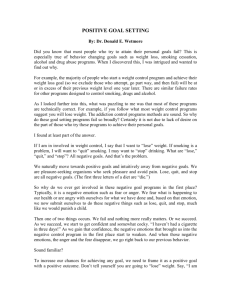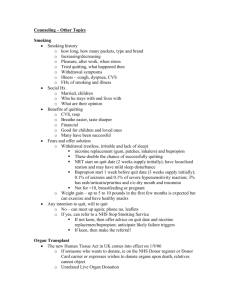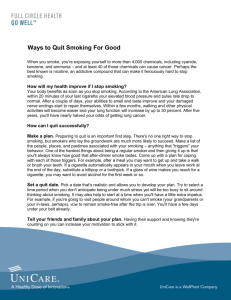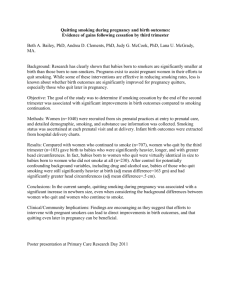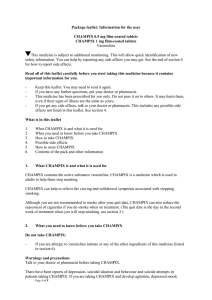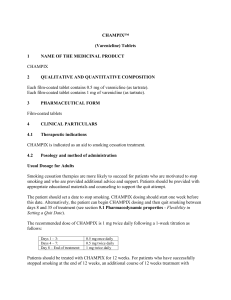Champix Patient Information Jan 2014
advertisement
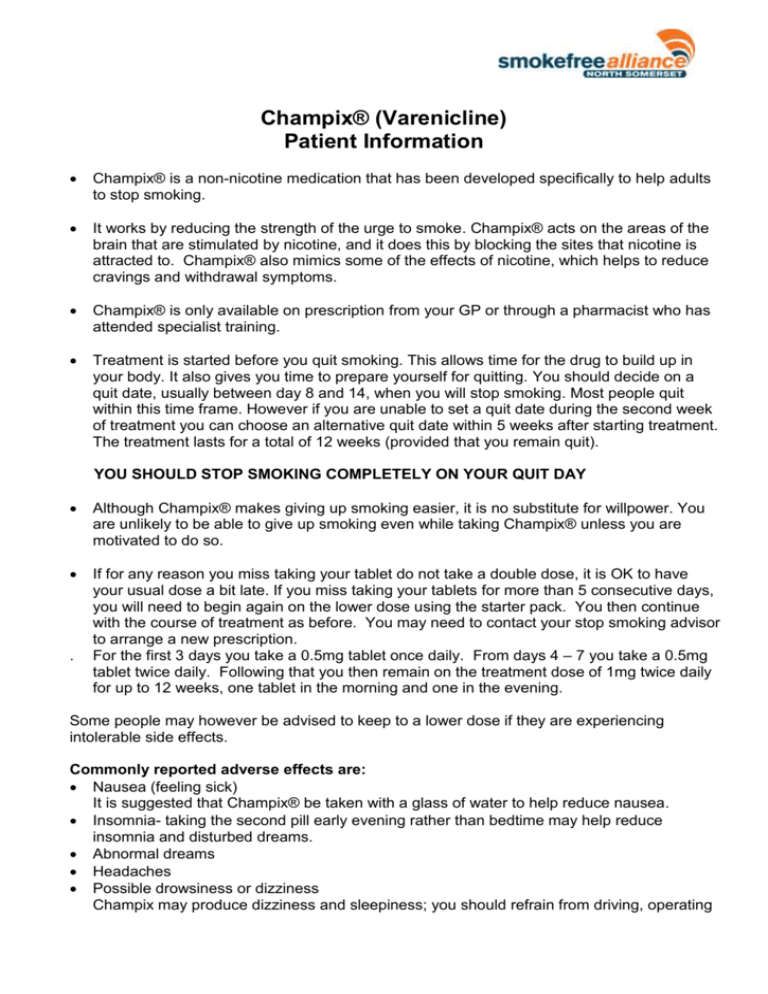
Champix® (Varenicline) Patient Information Champix® is a non-nicotine medication that has been developed specifically to help adults to stop smoking. It works by reducing the strength of the urge to smoke. Champix® acts on the areas of the brain that are stimulated by nicotine, and it does this by blocking the sites that nicotine is attracted to. Champix® also mimics some of the effects of nicotine, which helps to reduce cravings and withdrawal symptoms. Champix® is only available on prescription from your GP or through a pharmacist who has attended specialist training. Treatment is started before you quit smoking. This allows time for the drug to build up in your body. It also gives you time to prepare yourself for quitting. You should decide on a quit date, usually between day 8 and 14, when you will stop smoking. Most people quit within this time frame. However if you are unable to set a quit date during the second week of treatment you can choose an alternative quit date within 5 weeks after starting treatment. The treatment lasts for a total of 12 weeks (provided that you remain quit). YOU SHOULD STOP SMOKING COMPLETELY ON YOUR QUIT DAY Although Champix® makes giving up smoking easier, it is no substitute for willpower. You are unlikely to be able to give up smoking even while taking Champix® unless you are motivated to do so. If for any reason you miss taking your tablet do not take a double dose, it is OK to have your usual dose a bit late. If you miss taking your tablets for more than 5 consecutive days, you will need to begin again on the lower dose using the starter pack. You then continue with the course of treatment as before. You may need to contact your stop smoking advisor to arrange a new prescription. For the first 3 days you take a 0.5mg tablet once daily. From days 4 – 7 you take a 0.5mg tablet twice daily. Following that you then remain on the treatment dose of 1mg twice daily for up to 12 weeks, one tablet in the morning and one in the evening. . Some people may however be advised to keep to a lower dose if they are experiencing intolerable side effects. Commonly reported adverse effects are: Nausea (feeling sick) It is suggested that Champix® be taken with a glass of water to help reduce nausea. Insomnia- taking the second pill early evening rather than bedtime may help reduce insomnia and disturbed dreams. Abnormal dreams Headaches Possible drowsiness or dizziness Champix may produce dizziness and sleepiness; you should refrain from driving, operating complex machinery or engage in potentially hazardous activities until you know if this medication affects your ability to do this. Champix® is not suitable for patients who: Are under 18 years of age Have end stage renal (kidney) disease Are pregnant or are breastfeeding Special notes Giving up smoking with or without treatment can cause various temporary symptoms – these could include changes in mood (like feeling irritable, depressed, frustrated or anxious), sleeplessness, difficulty concentrating, constipation, decreased heart rate and increased appetite or weight gain. Depression Stopping smoking can sometimes unmask underlying psychiatric illness such as depression, and smokers should be should be aware of this risk. Depression can sometimes be accompanied by suicidal thoughts and behaviour. If any changes such as depression, irrational behaviour, suicidal ideas or behaviour occur or are noticed by the people close to the person using Champix® then the drug should be stopped and their doctor contacted immediately. Seizures In clinical trials and post-marketing experience there have been reports of seizures in patients with or without a history of seizures, treated with Champix®. Champix® should be used cautiously in patients with a history of seizures or other conditions that potentially lower the seizure threshold. If any changes are noticed which cause you (or people close to you) suspicion, the drug should be stopped and their doctor contacted immediately. Cardiovascular symptoms New or worse heart or blood vessel (cardiovascular) problems have been reported primarily inpeople who already have cardiovascular problems. Tell your doctor if you have any changes in symptoms during treatment with CHAMPIX. Get emergency medical help right away if you have symptoms of a heart attack or stroke. Other medications Champix® is not expected to affect the way other drugs or medications work, or vice versa, but you should tell your doctor or pharmacist if you are taking any other medications, including those obtained without a prescription. Stopping smoking (with or without Champix®) may alter the way other medications work (e.g. theophylline, warfarin and insulin), so dose adjustment may be necessary in some cases. This information does not replace the Champix® patient information leaflet. You should read the patient information leaflet contained in the pack before you start taking Champix®.
